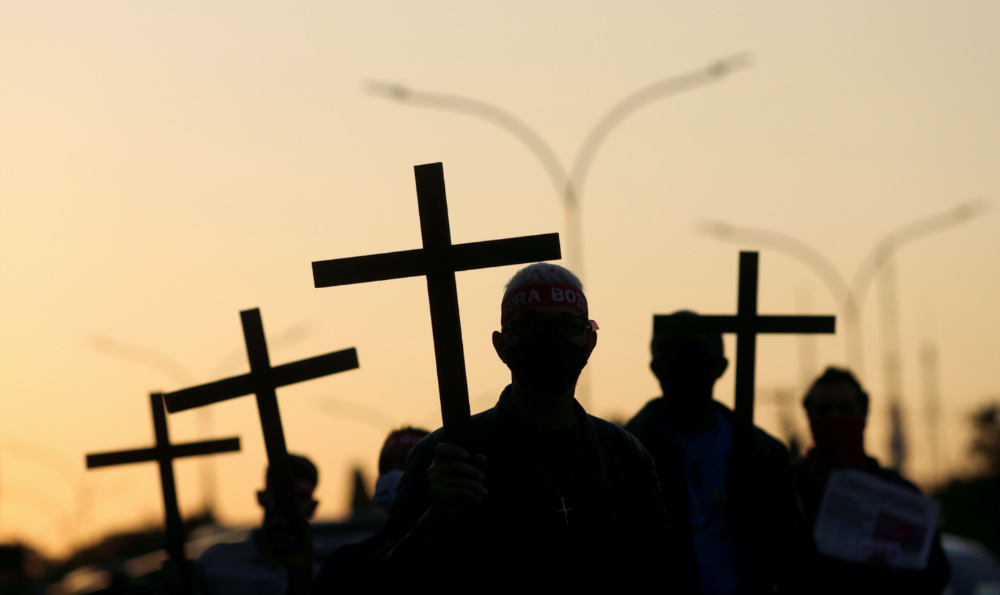Global coronavirus cases surpassed five million on Wednesday, with Latin America overtaking the United States and Europe in the past week to report the largest portion of new daily cases globally.
It represents a new phase in the virus’ spread, which initially peaked in China in February, before large-scale outbreaks followed in Europe and the United States.

A bird is pictured over a cross during a mass burial of people who passed away due to the coronavirus disease at the Parque Taruma cemetery in Manaus, Brazil on 13th May. PICTURE: Reuters/Bruno Kelly/File photo
Latin America accounted for around a third of the 91,000 cases reported earlier this week. Europe and the United States each accounted for just over 20 per cent.
A large number of those new cases came from Brazil, which recently surpassed Germany, France and the United Kingdom to become the third-largest outbreak in the world, behind the United States and Russia.
Cases in Brazil are now rising at a daily pace second only to the United States.
The first 41 cases of coronavirus were confirmed in Wuhan, China, on 10th January and it took the world until 1st April to reach its first million cases. Since then, about one million new cases are reported every two weeks, according to a Reuters tally.
At more than five million cases, the virus has infected more people in under six months than the annual total of severe flu cases, which the World Health Organization estimates is around three million to five million globally.
The pandemic has claimed over 326,000 lives, though the true number is thought to be higher as testing is still limited and many countries do not include fatalities outside of hospitals. Over half of the total fatalities have been recorded in Europe.
Despite the continued increase in cases, many countries are opening schools and workplaces following weeks of lockdown that have stemmed the spread.
Financial markets have also been boosted slightly by promising early results from the first US vaccine trial in humans.
Earlier, the World Health Organization expressed concern about the rising number of new coronavirus cases in poor countries, even as many rich nations have begun emerging from lockdown.
The global health body said on Wednesday that 106,000 new cases of infections of the novel coronavirus had been recorded in the past 24 hours, the most in a single day since the outbreak began.
“We still have a long way to go in this pandemic,” WHO Director-General Tedros Adhanom Ghebreyesus told a news conference. “We are very concerned about rising cases in low and middle income countries.”
The WHO has come under fire from US President Donald Trump, who accuses it of having mishandled the outbreak and of favouring China, where the virus is believed to have emerged late last year. This week Trump threatened to withdraw from the WHO and permanently withhold funding.
Tedros acknowledged receiving a letter from Trump, but declined to comment further.
Tedros said he was committed to accountability and would carry out a review into the response to the pandemic. Such a review was demanded by member states in a resolution this week that was passed by consensus, although the United States expressed reservations about some elements of it.
“I said it time and time again that WHO calls for accountability more than anyone. It has to be done and when it’s done it has to be a comprehensive one,” Tedros said of the review, while declining to say when it would start.
Dr Mike Ryan, head of WHO’s emergencies program, said such assessments are normally conducted after an emergency is over.
“I for one would prefer, right now, to get on with doing the job of an emergency response, of epidemic control, of developing and distributing vaccines, of improving our surveillance, of saving lives and distributing essential PPE to workers and finding medical oxygen for people in fragile settings, reducing the impact of this disease on refugees and migrants,” he said.
Tedros said he had long been looking for other sources of funding for the WHO, saying its $US2.3 billion budget was “very, very small” for a global agency, around that of a medium sized hospital in the developed world.
In comments that could further annoy Trump, Ryan, said people should avoid using the malaria medicine hydroxychloroquine to treat or prevent coronavirus infection, except as part of a clinical trial to study it.
Trump has said he is taking hydroxychloroquine to prevent coronavirus infection.
“At this stage, [neither] hydroxychloroquine nor chloroquine have been as yet found to be effective in the treatment of COVID-19 nor in the prophylaxis against coming down with the disease,” Ryan said. “In fact, the opposite, in that warnings have been issued by many authorities regarding the potential side effects of the drug.”
– With STEPHANIE NEBEHAY and EMMA FARGE in Geneva, Switzerland, and BRENNA HUGHES NEGHAIWI in Zurich.






